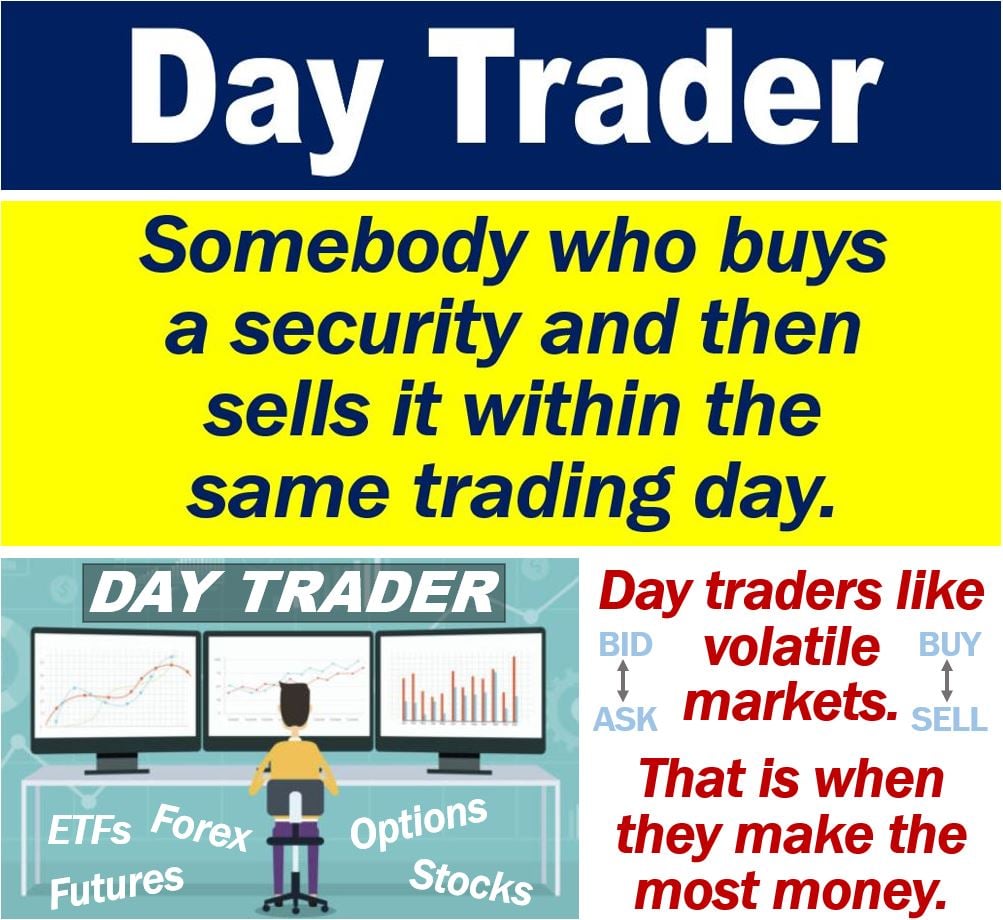What is a day trader? Definition and examples
A Day Trader is a person who buys and sells securities in the same trading day. This means that any operation that occurred within the trading day must be closed at the end of it.
Stocks, futures, currencies, bonds, and options, for example, are securities, i.e., financial instruments.
Day traders leverage various strategies such as swing trading, arbitrage, and scalping to capitalize on market inefficiencies throughout the trading day.
Trades commonly take place in the foreign exchange (forex) market and the stock market. However, they can occur in any marketplace. In this context, ‘marketplace’ means the same as ‘market’ in its abstract sense.
The word trader is somebody who buy and sells goods and services. In the world of finance, a trader purchases and sells financial instruments.
Day trader likes volatility
One of the main objectives of a day trader is to exploit small price movements in highly liquid stocks. For a day trader, the most favorable condition is when the market is volatile.

A day trader with the right tools at hand and experience will have an advantage over others.
According to Investopedia, to become a day trader:
“You should understand technical analysis and all of the tools used to dissect chart patterns, trading volume and price movements.”
Day traders must have access to high-speed Internet and a powerful computer. They should also have access to a professional trading platform.
Additionally, they should have software that provides real-time data feed and news. Keeping track of any market change, no matter how small, is crucial.
Many traders, in fact, recommend having more than two monitors to display charts and other relevant data.
Day trader – two types
There two types of day traders:
- Those who work for a trading or financial institution, i.e., institutional day traders.
- Those who work on their own, i.e., retail or independent day traders.
Retail day traders typically use their own money. Due to their limited resources, however, they may struggle to compete against those who work in large organizations.
Day traders must know which stocks to buy and sell. They must also be familiar with key trading times and potential market conditions.
There are two things successful traders must do:
- Begin their day with a trading plan.
- Not risk too much capital.
Regarding what day traders do, TheBalance.com says:
“A day trader’s job is to simply find trade setups. Execute, and then manage those trades according to the strategy.”
Always alert
It is definitely not the job for people with a short attention span. Successful day traders need to stay super-focused throughout the day.
They need to be familiar with all the jargon and notions of their specific marketplace. For example, knowing the difference between the bid and ask price is crucial if they want to make a profit.
Knowing or sensing when to buy or sell a security, i.e., above or below the bid/ask price, is crucial. All data regarding bid/ask prices changes from one second to the next.
A day trader must often make fast and cold-hearted decisions. They have to act swiftly, sometimes with limited and conflicting information.
Equally important, they must maintain strict discipline to follow their trading plan and resist the temptation to overtrade.
Video – What’s a day trader?
This video presentation, from our YouTube partner channel – Marketing Business Network, explains what a ‘Day Trader’ is using simple and easy-to-understand language and examples.

